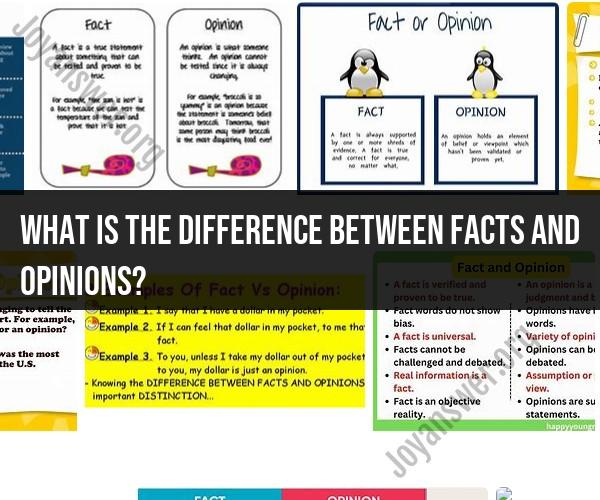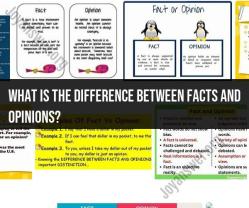What is the difference between facts and opinions?
Distinguishing between facts and opinions is fundamental to critical thinking and effective communication. Here's an explanation of the key differences between facts and opinions:
Facts:
Objective: Facts are objective statements that can be independently verified and proven to be true or false. They are not influenced by personal feelings, interpretations, or biases.
Empirical: Facts are based on empirical evidence, which means they are rooted in observable and measurable phenomena. They can be confirmed through direct observation, experimentation, or reliable sources.
Universal: True facts are universally accepted and do not change depending on an individual's perspective or belief. They remain constant regardless of one's opinions.
Examples:
- "Water boils at 100 degrees Celsius at sea level."
- "The Earth orbits the Sun."
- "The chemical formula for water is H2O."
Opinions:
Subjective: Opinions are subjective statements that reflect personal beliefs, feelings, interpretations, or preferences. They are influenced by an individual's perspective and may vary from person to person.
Non-Verifiable: Opinions cannot be proven true or false in the same way facts can because they are based on personal viewpoints and emotions, which are not universally measurable.
Varied: Opinions can differ among individuals, and they may change over time as a person's experiences and perspectives evolve.
Examples:
- "Chocolate ice cream is the best flavor."
- "I believe that the government should invest more in education."
- "In my opinion, the movie was boring."
Key Points:
- Verification: Facts can be verified through empirical evidence, whereas opinions cannot be definitively proven.
- Subjectivity: Facts are objective and not influenced by personal biases, while opinions are inherently subjective.
- Consistency: Facts remain consistent and do not change with different viewpoints, while opinions can vary widely.
- Debate: Opinions can be debated and discussed, and people are entitled to their own viewpoints. Facts provide a common ground for discussion by establishing a shared reality.
It's essential to recognize the distinction between facts and opinions in everyday communication, media consumption, and critical thinking. Misrepresenting opinions as facts or vice versa can lead to misunderstandings and confusion. When engaging in discussions or evaluating information, it's valuable to be aware of whether a statement is presenting verifiable information or expressing a personal perspective.


